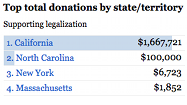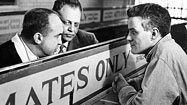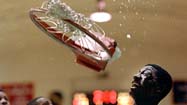Teacher responses to the 2010 release
The following is a list of teacher responses to their "value-added" ratings during the intial release in 2010. See the most recent responses »
The Times gave LAUSD elementary school teachers rated in this database the opportunity to preview their value-added evaluations and publicly respond. Some issues raised by teachers may be addressed in the FAQ. Teachers who have not commented may do so by contacting The Times.
|
|
 Delicious
Delicious
|
 Digg
Digg
|
 Facebook
Facebook
|
 Twitter
Twitter
|





One comment is that the LAUSD history may not represent the period for which the value-added rating is generated. For example, I did not teach 3rd through 5th grade while at Fletcher Drive Elementary. I was a math instructional coach at that time and did not carry a classroom roster. My rating reflects solely my experience at Fernangeles Elementary.
My recommendation is that the school that is listed immediately below a teacher's name should always represent the experience being rated. If that is not possible, a disclaimer should be added to account for such differences.
August 28, 2010 at 9:13 a.m.
I think this is one tool teachers can use to improve their instruction. I am happy to see that my rating is "most effective overall" because I work hard to advance all of my students. I think part of my success comes from my ongoing reflection of my instructional methods. That reflection causes me to change my strategies, lessons, and assignments frequently. Fluidity can be tiring, but when I see my students' success, I realize my effort was worthwhile.
August 28, 2010 at 8:50 a.m.
Just wanted to say a couple things:
1) Half of the students in my 2007 - 2008 5th grade class were from my 2006 - 2007 4th grade class (I taught 4th grade for three years prior to moving up to 5th grade). I am interested to see my value-added rating from those school years, too, but the 2006 - 2007 school year in particular.
2) During the 2007 - 2008 school year, I was the STAR Testing Coordinator at Sunny Brae. I also served on the School Leadership Council, the Library Leadership Committee, the District-School Leadership Team (in accordance with NCLB/Program Improvement requirements), and as a grade-level chairperson. I mention this only because many teachers have a few, if not several, adjunct duties beyond the daily teaching responsibilities. While I enjoyed these extra responsibilities, I know that they took away from my teaching and dedication to my students.
3) I was actually not too surprised to learn of my value-added ratings. I will be the first to admit that I was more comfortable teaching Math than Language Arts - we certainly spent more time on Math than any other subject. Plus, the Language Arts curriculum we were using at the time was the 2000 edition of SRA/Open Court Reading, which by now is ten years old. I wonder how much more interesting/engaging/relevant a newer, more recent edition would be for both the students and the teachers.
Anyway, this whole series of articles has been fascinating to me. I may be in the minority, but I think the data and value-added ratings should be made public. As teachers, we are employees of the state and should be held accountable to the taxpayers that give us our salaries. I was always very open and honest with my students (and their parents) about all of their test scores, may they be from the CST or from the quarterly math assessments, Open Court unit assessments, quizzes, etc. They're not secret and they affect the students just as much as they affect the teachers. I would always tell my students that the test results let me know what I taught well, what I needed to teach again, and what I needed to teach better or differently. The test results let them know how they were learning, what they understood the best, and what they still needed to review. Why shouldn't the parents and the public know this, too?
*Disclaimer: I no longer teach in the LAUSD. In fact, I resigned at the end of the 2007 - 2008 school year after five consecutive years at Sunny Brae Avenue ES. I have not taught since the 2008 - 2009 school year as I chose to pursue a Masters and credential full-time. Right now, my husband and I are expecting our first child. I do not expect to teach in LAUSD (or any other district) any time soon, but of course am still interested in all things education.
August 27, 2010 at 10:57 p.m.
While I do believe that value-added scores are useful tools to teachers and administrators, I think that publicly releasing them will not help the situation. Parents knowing who this rating system has deemed "effective" or "less effective" will only create a forum for them to gossip, and ultimately pit teachers against each other. It feels like a public "stoning" and makes me fearful of the competitive "teaching to the test" that could ensue as a result of this rating system.
Also, I'd like to point out that I am one of the many teachers that was laid off in 2009 and am pleased to see that my students scored well despite a challenging school year as a substitute in my own class, and a slap in the face by the district.
August 27, 2010 at 10:47 p.m.
Your analysis addresses only a very small part of what makes a teacher effective. Unfortunately, you reinforce the faulty belief that education can be measured by a single test when, in fact, many different aspects contribute to student success. Much of what occurs in the classroom cannot be measured, yet, it is vital to a child's understanding and his ability to succeed in society. I am concerned that now even more time and effort will have to be spent on reviews to prepare students for testing, which will take away valuable time from what really matters: learning about the world and gaining knowledge at a pace that is developmentally appropriate.
I am disappointed and angry that The Times has chosen a limited group of elementary school teachers and is blaming them for deficits in our educational system. Elementary schools in particular have made great strides over the past few years as shown by the very same data that you are now using to discredit their teachers. If you were truly interested in education reform, you would focus on what research has already pointed out: We need small classes with dedicated and knowledgeable professionals, time to prepare and reflect on best practices, a curriculum that is developmentally appropriate, parent involvement at home and at school, and flexibility in a system that allows ridiculously expensive schools to be built at a time when funding for basic education continues to be slashed.
August 27, 2010 at 10:18 p.m.
As a teacher you are always reflecting and fine tuning your craft and data is one way to identify areas where I can improve as an educator. I hope that others will view the data as a tool for improvement not a final judgment on any one teacher’s true effectiveness.
The data mirrors my own self reflection upon my test scores over the years. Math has always been a challenge to teach, especially strategies that make the math language of the of the test more accessible to my students. It is for this reason that I have spent the past year focusing on professional development for math and science with an emphasis on making the language of these subjects more accessible to English learners. It will be interesting to see if more meaningful professional development will increase my "value-added score".
August 27, 2010 at 9:29 p.m.
From an early age, my upbringing and schooling have led me to set high standards for myself. When I have failed at something (as a child I was downright terrible at playing little league baseball) I have tried to figure out how to excel in some other area (by my teens my tennis ability and communication skills allowed me to make valuable contributions to my high school winning state championships in varsity tennis and interscholastic debate). While there have been times when I have felt unfairly judged or categorized, my firm belief is that we learn more from our mistakes and shortcomings than we do from our successes. Though I strongly disagree with the decision of The LA Times to publish an evaluation of my teaching through what many feel to be a “value-added” methodology at best imperfect and at worst deeply flawed, that the paper has chosen to associate words like “average,” least effective” and “less effective” with my performance relative to my students’ abilities to choose the right answers on the CST suggests to me that I have the opportunity before me to reflect on my teaching practice, to learn something useful, and perhaps one day excel as a teacher in raising student’s standardized test scores. Standardized test scores are not what I remember most about my elementary school years. Nor is the promotion of standardized test growth the reason I became a teacher in the first place. But to the extent that many of the powers that be value that measure of instruction more than the areas of education that most inspire me (e.g., creative arts like music which have led me to learn how to play the violin as an adult; being the kind of role model who encourages children to grow interpersonally and become willing to listen to and respect one another; and so forth) I certainly owe it to my students to do a better job increasing their scores. If given the chance, I publicly promise here to try to learn from where I have fallen short and give this endeavor my best effort.
August 27, 2010 at 9:02 p.m.
As I look at my "evaluation" based on numbers, I am mixed with emotions. On one hand, I am pleased with what I see, on the other hand, my heart plummets because don't want people to believe that I am teaching to the curriculum but instead, using the curriculum to support my learners. I am not a person who believes that an effective teacher is based on scores, but based on morals, personal connections you have with the child, background of the families because of culture or socioeconomic status, and the such.
I also think about the other teachers who give it their all, but with the given area they teach, the location itself may be a struggle, but their students are becoming great people as a whole. For instance, my colleague works in a low-performing school, but the changes that I see in the classroom when I visit are amazing. Then I think of other teachers who I know are working in high performing schools who are teaching 90% from the "teacher book" to achieve great test scores, and they are praised for being "good teachers." What about the colleague of mine who learned what motivates their children from the low performing school? How are they evaluated? Are they evaluated for working after school hours? Are they evaluated on traveling around Los Angeles to find materials with their own money to teach so their children can fall in love with learning? Or are they evaluated by those who just show up in the morning, picks up a teacher's resource guide, and then teaches?
As a child growing up, my test scores were in the average range because I was not inspired to learn. This is coming from being as one of the 3% minority vs. a 97% Caucasian school from K-12. Since I was "different' growing up, the ridicule and belittlement were quite harsh. Yes, my school that I attended was rank in the top 10 while I attended, but at what stake? Are my scores more important than my well-being? What I can sal is that my morale and self-confidence were at a low until my time in undergrad. How effective are those K-12 teachers?
I know test scores is one way to measure performance, but how can we incorporate other aspects as well?
If teachers are being evaluated, why not go directly to the heads of the school to see their performance as administrators? Since evaluations should be conducted as a whole, everyone on the district level, and state level, should be measured as well. If people want to evaluate teachers, then teams from a 3rd party should go into ALL schools for at a few years to see the effectiveness of a teacher. Without seeing students from Day 1 and follow through, it is hard to "evaluate" what a teacher puts daily to enrich the lives of their learners. Without seeing a teacher in action at least once a week, it is a challenge to evaluate teachers.
Today, I am pleased with my performance as a teacher based on student and parent evaluations. A major reason why I am confident as a teacher is that I was, and still am, in a school with an inspiring and supportive administrative team. Without them, I would not be the teacher I am today. Without the connection I have with my students, I would not be the teacher I am today.
When will the evaluations be more conducive to the productivity of the learning instead of bringing down the moral of great teachers and protecting some teachers who have no connection with the students?
Would you want your child to be an automaton or an individual thinker who cares about more than just scores?
August 27, 2010 at 8:36 p.m.
Although I find this information useful to refine my instruction I have to admit I am really surprised by the ratings. I monitor my student scores very closely and have always noticed a gain in their math scores. I have seen many of my students move up one to two bands a year in math. I would really like to see a breakdown of the data that was used for my ratings.
August 27, 2010 at 8:14 p.m.
My original comment was not posted. It is my hope that this one will be. I am extremely sad by this rating. There are multiple factors that make an effective teacher, and I hope that former and current students take this into consideration. This “study” did not take into account the fact that, statistically, it is NORMAL for 5th grade scores to go down. As a result, most 5th grade teachers will be at the lower end of the spectrum; not because their teaching is ineffective, but because of the multiple standards that are to be learned that academic year. Additionally, I was on maternity leave for half of two of these school years. I don’t feel that my substitute teachers’ results should count as my scores, but they do (according to LA Times) because I was still the “contracted teacher.” It saddens me that the career that I love is being called into question this way. I have dedicated the last 10+ years to earning my credential and teaching because I love children and I hope to make the future of this country brighter. Each morning when I go to work, I keep in mind that I am responsible for the education of the young people in my care. I work diligently to teach the standards and address the multiple learning styles of the diverse children in my classroom. I am always open to collaboration with coworkers and professional development. I teach because I love to learn, and I hope to instill that love in the future generations. I am deeply insulted that I am now branded as a “less effective than average” teacher based on half truths and sensationalism.
August 27, 2010 at 7:28 p.m.